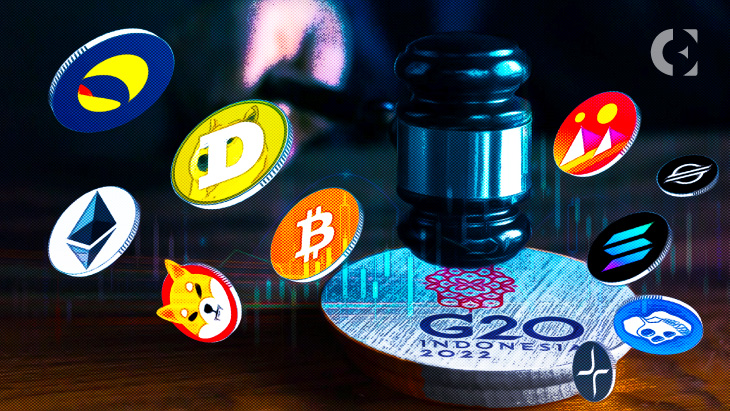- Leaders at the G20 summit will look at proposed regulations from FSB and OECD.
- OECD will propose tax regulations; FSB will recommend a framework for crypto.
- Several major cryptocurrencies could be affected as a result of these regulations.
The Organisation for Economic Co-operation and Development (OECD) recently announced its intention to introduce the Crypto-Asset Reporting Framework, or CARF, at the G20 summit.
In light of the proliferation of unmonitored cryptocurrency exchanges and wallet providers, the proposed crypto tax system called for the automatic yearly exchange of information on cryptocurrency transactions between countries.
Furthermore, the Financial Stability Board (FSB), an international watchdog, has also recommended a comprehensive framework for cryptocurrencies to mitigate risks while “harnessing potential benefits of the technology.”
To “promote the consistency and comprehensiveness of regulatory, supervisory, and oversight approaches to crypto-asset activities and markets,” the FSB will reportedly present proposed suggestions to the G20 finance ministers and central bank governors.
Regulating cryptocurrencies goes against the essence of digital assets. Experts believe that such regulations will hurt the most notable crypto projects. If the G20 Summit of 2022 agrees to regulate cryptocurrencies, the following cryptos are expected to be major talking points.
Terra Classic
Terra network’s bankruptcy this year devastated the market. Terra’s fall sparked a bear market. Given this, Terra Classic stands out as the lone project that requires extensive involvement from the relevant authorities.
Bitcoin
Bitcoin holds a considerable proportion of the entire market value; therefore, policymakers may regulate the leading cryptocurrency since the crypto markets often tend to follow Bitcoin. BTC’s volatility may also be examined.
Solana
The Solana network has suffered multiple disruptions over the past few months resulting in heavy price fluctuations. This puts it vulnerable to regulation.
Ripple
Despite several regulatory barriers, Ripple (XRP) remains a prominent cryptocurrency. With the ongoing lawsuit against the SEC, there’s already a lot of regulatory confusion regarding its status. It is a possibility that regulators could take a jab at whether cryptocurrencies like Ripple are a security or not.
Shiba Inu and Dogecoin
The riskiness of meme coins increases the likelihood that they will be regulated. Last year’s bull market propelled both Shiba Inu and Dogecoin to the forefront. However, a significant portion of that value was lost the following year.
Apecoin
Apecoin is losing value as many NFT ventures return losses to investors. It’s possible that authorities may try to clamp down on the NFT scene because of its widespread influence. NFTs at present have no defined regulations, and Apecoin, owing to its widespread use in the sector, could be a starting point for regulators.
Decentraland
Users build, administer, and own Decentraland, a decentralized metaverse. It’s possible that regulators will be looking at the Metaverse ecosystem, even if it’s not yet obvious what their role will be.
Disclaimer: The information presented in this article is for informational and educational purposes only. The article does not constitute financial advice or advice of any kind. Coin Edition is not responsible for any losses incurred as a result of the utilization of content, products, or services mentioned. Readers are advised to exercise caution before taking any action related to the company.







